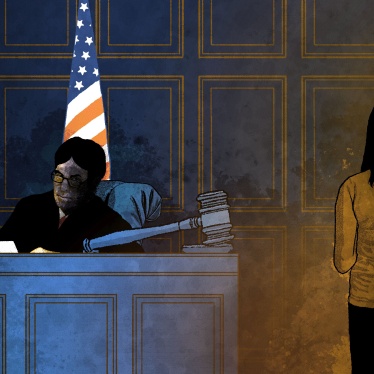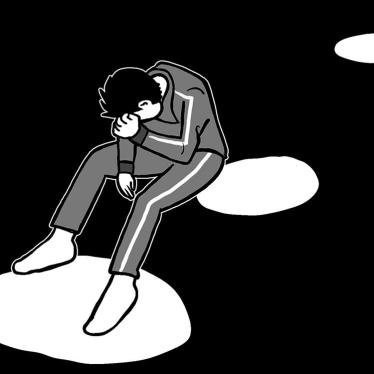President-elect Barack Obama
Obama-Biden Transition Project
Washington, DC 20720
Dear President-elect Obama:
We write to you regarding Omar Khadr, the 22-year-old Canadian national slated to be tried by military commission at Guantanamo for crimes allegedly committed when he was aged 15. If the trial, now scheduled for January 26, 2009, is allowed to go forward, Omar Khadr will become the first person in recent years to be tried by any western nation for war crimes allegedly committed as a child.
We urge that upon taking office, you act quickly to suspend the military commissions, drop the military commission charges against Khadr, and either repatriate him for rehabilitation in Canada or transfer him to federal court and prosecute him in accordance with international juvenile justice and fair trial standards.
Background
United States forces captured Khadr on July 27, 2002, after a firefight in Afghanistan that resulted in the death of US Army Sergeant First Class Christopher Speer, as well as injuries to other soldiers. Khadr, who was seriously wounded, was initially detained at Bagram Air Base in Afghanistan. There, according to his lawyers, he was forced into painful stress positions, threatened with rape, and hooded and confronted with barking dogs.
In October 2002, US officers transported Khadr to Guantanamo, where the abusive interrogations continued, and where he has been ever since. Khadr told his lawyers that his interrogators shackled him in painful positions, threatened to send him to Egypt, Syria, or Jordan for torture, and used him as a "human mop" after he urinated on the floor during one interrogation session. He was not allowed to meet with a lawyer until November 2004, more than two years after he was first captured.
During his third year of detention, Khadr was charged with murder and other related crimes under the first set of military commissions authorized by President Bush. Those charges were dismissed when the Supreme Court ruled the commissions unlawful in the case of Hamdan v. Rumsfeld. In 2007, under newly authorized commissions, the United States government charged him with murder, attempted murder in violation of the laws of war, conspiracy, providing material support for terrorism, and spying. He faces a possible life prison sentence.
Violations of Human Rights and Juvenile Justice Standards
Khadr's prolonged detention in Guantanamo Bay contravenes the United States' binding legal obligations under the International Covenant on Civil and Political Rights and international juvenile justice standards. Although these international standards allow for detention of juveniles only as a last resort and require prompt determination of juvenile cases, Khadr was detained for more than two years before being provided access to an attorney, and for more than three years before being charged before the first military commission. After more than six years the lawfulness of this detention still has not been judicially reviewed on the merits.
Further, despite international standards requiring treatment of children in accordance with their age, as well as segregation of children and adults, Khadr has been housed with adult detainees, even when other child detainees were being housed together in Guantanamo's Camp Iguana. The abusive interrogations and prolonged detention in solitary confinement violated both international juvenile justice standards and general humane treatment standards, including Common Article 3 of the Geneva Conventions, and other binding prohibitions against torture and cruel, inhuman, and degrading treatment.
Failure to Comply with Obligations under the Optional Protocol
International law requires the United States to recognize the special situation of children who have been recruited or used in armed conflict. The Optional Protocol to the Convention on the Rights of the Child on the Involvement of Children in Armed Conflict ("Optional Protocol"), which the United States ratified in 2002, explicitly prohibits the recruitment or use of children under the age of 18 in armed conflict by non-state armed groups and requires state parties to criminalize such conduct. It also requires the rehabilitation of former child soldiers within a signatory's jurisdiction, including "all appropriate assistance for their physical and psychological recovery and their social reintegration."
Yet in its dealings with Khadr, the US government has ignored its legal obligations under the Optional Protocol. For years, Khadr was denied access to education, vocational training, counseling, or any family contact. Instead, he was held in isolation and abused.
Last May, the UN Committee on the Rights of the Child, which oversees compliance with the Optional Protocol, criticized the United States' treatment and military prosecutions of children held at Guantanamo, and called on the US government to treat children in its custody in accordance with international juvenile justice standards.
Military Trial Moving Ahead
Despite widespread criticism of the military commission system and its treatment of Omar Khadr, the outgoing Bush administration has continued to move his case toward trial. Motions hearings are now set for January 19, with a trial date scheduled for January 26. Unless you act quickly to suspend the commissions, Khadr will become the first person in recent history to be prosecuted for war crimes allegedly committed as a child, before a system that you have consistently criticized as "flawed."
As you are aware, you voted against the legislation passed by Congress in October 2006 to authorize the commissions, calling it a "betrayal of American values." When charges against Khalid Sheikh Mohammed and the 9/11 co-conspirators were announced in February 2008, you criticized that decision on the grounds that "[t]hese trials are too important to be held in a flawed military commission system" and that the men should be tried in federal court or by courts-martial, in order to "demonstrate our commitment to the rule of law." Just five months ago, after the conviction of Salim Hamdan, you reiterated your criticism of the commission process, stating it is "time to better protect the American people and our values by bringing swift and sure justice to terrorists through our courts and our Uniform Code of Military Justice."
You have also co-sponsored legislation (the Child Soldier Prevention Act, S. 1175, which was subsequently incorporated into the Trafficking Victims Protection Reauthorization Act, and the Child Soldier Accountability Act, S. 2135) designed to help end the use of child soldiers. These measures, both signed into law in 2008, commit the US government to expand services to rehabilitate child soldiers and reintegrate them back into their communities, and allow the United States to prosecute the individuals responsible for the recruitment of children as soldiers.
Now is the chance to ensure America's commitment to the rule of law by putting an immediate halt to Omar Khadr's trial. If there is evidence that Khadr committed a federal crime, he should be transferred to a federal court and prosecuted in accordance with international juvenile justice and fair trial standards; if not, he should be repatriated for rehabilitation and integration.
This is also the course you should take with the other known juvenile detainee, Mohammed Jawad, an Afghan, who has been in Guantanamo for six years, reportedly subjected to torture, sleep deprivation, and other abuse, and charged with attempted murder by the military commission for acts allegedly committed when he was either 16 or 17 years old. No trial date is currently set in his case.
We hope that you will act quickly on this matter in the interest of justice, protection of human rights, and the rule of law.
Sincerely,
American Civil Liberties Union
Amnesty International
Coalition to Stop the Use of Child Soldiers
Human Rights First
Human Rights Watch
cc:
Secretary of Defense Robert Gates
Eric Holder






